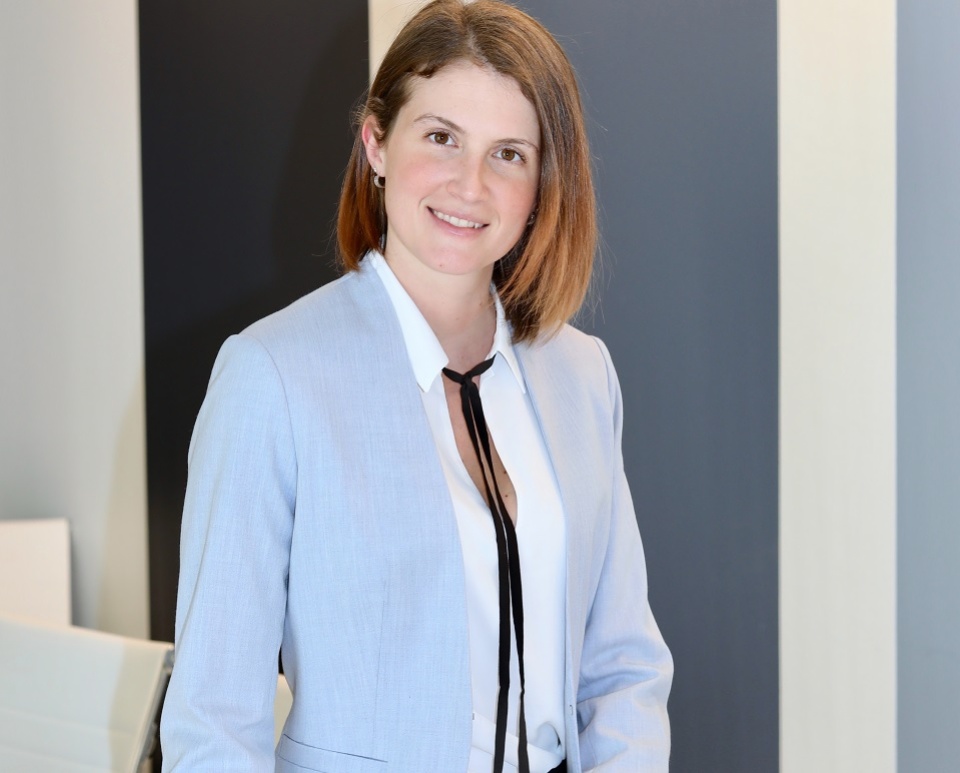Audrey Morabito has always loved helping others. Her
passion to make a difference led her to her career as a sexologist. She wanted
to help people in their quest for well-being and balance. Today, she shares her
journey with us in the hopes that it may help you, too.
You may think those who turn to the help of a sexologist do
so only for issues related to sex and sexuality. “Indeed it is for this reason,
among other things, but the definition of human sexuality is very broad,”
Morabito says. “People often have a narrow definition of sexuality that comes
down to the sexual act, but it's more than that. As a sexologist, we offer our
support in everything related to human relations. We are here to help and equip
those who feel more fragile or vulnerable in all kinds of contexts. In everyday
life, each of us has a toolbox but we often forget how to use it. I'm here to
support my clients and help them gain more confidence and remind them of how
each of these tools work.”
When we come to the conclusion that it is time to ask for
the help needed to achieve a better state of well-being, what are the
motivations that drive us? “It always starts with a difficulty or discomfort
experienced in everyday life. Motivations are infinitely varied. It can be a
parent who has questions about the development of his child or who wants to
find the right words to talk about sex with him,” Morabito explains. “There are
also people who come to get help dealing with crises of all kinds. We can also
talk about jealousy, break-ups or separation, sexuality, and more. There is
always some form of suffering that we want to alleviate.”
To consult a sexologist means wanting to deconstruct bad relationship
models and move towards healthier relationships. Morabito receives a wide
variety of issues in her office, some from new parents. “There are so many
questions and issues about couples becoming a family. How to preserve love
within the couple? How do we juggle being new parents without losing ourselves
as individuals and as a couple? In perinatality, we can explore the pre and postnatal
periods. The whole emotional and psychological part of becoming a parent is
just as transformative as having a child.” Morabito explains.
Being able to recognize there is a problem and pointing
it out is a big step towards healing. One of Morabito’s main priorities is to
help women in difficulty and victims of domestic violence. “Since the beginning
of my studies, I have done a lot of volunteer work with women in difficult
situations. My desire was help them to enable themselves to learn to love each
other, to respect each other and especially to help themselves develop strategies
to become empowered,” Morabito says. “In my practice, it has become a priority.
When we go through such a difficult situation we often find ourselves without a
safety net or tools and ways to regain power over our lives. Often, these women
have a limited social support, limited resources and emotional distress. Counselling
is an integral part of the journey towards wellness. Together we explore the
difficulties experienced and we put strategies in place to help find a balance
and to be on the road to empowerment.”
Despite the complexity of the different issues that Morabito
addresses in each of her consultations, she remains optimistic. It's the small
wins that are the most important. “When I realize that the tools and strategies
put in place deliver tangible results, that my clients manage to make small
changes that make their lives more enjoyable, it fills me with happiness. I can
say mission accomplished. To see them regain power over their lives is a great
satisfaction. We are all capable of making changes but sometimes it takes a
little help and that's what I offer to those who trust me.”
Sometimes, it's easier to progress in a group setting and
Morabito understands that. She offers workshops of all kinds to guide parents
in the sexual education of their children, for women in difficulty or even for
those with HIV. “The power of the group is undeniable. Knowing that we are not
alone in experiencing this kind of questioning reassures and comforts us. There
are beautiful exchanges when we discuss in groups. Walls fall and leave place
for something more authentic and true,” Morabito says. Morabito also offers training
sessions for workers that are adapted to the work environment such as; sexual
harassment, gender equality, etc.

 In The Latest Issue:Latest Issue:
In The Latest Issue:Latest Issue:
- A Bittersweet Farewell
- The new Laval Aquatic Co...
- The End of an Era:
Articles
Calendar
Virtual- ANNUAL TEACHER APPRECIATION CONTEST
- APPUI LAVAL
- ARTS & CULTURE
- CAMPS
- CAR GUIDE
- CCIL
- CENTENNIAL ACADEMY
- CHARITY FUNDRAISING
- CITYTV
- COSMODÔME
- COMMUNITY CONNECTIONS
- COVER STORY
- DINA DIMITRATOS
- ÉCOLE SUPÉRIEURE DE BALLET DU QUÉBEC
- EDITORIALS
- ÉDUCALOI
- EDUCATION
- EMPLOYMENT & ENTREPRENEURSHIP
- FÊTE DE LA FAMILLE
- FÊTE DU QUARTIER SAINT-BRUNO
- FAMILIES
- FESTIVAL LAVAL LAUGHS
- FÊTE DE QUARTIER VAL-DES-BRISES
- FINANCES
- GLI CUMBARE
- GROUPE RENO-EXPERT
- HEALTH & WELL-BEING
- 30 MINUTE HIT
- ANXIETY
- CHILDREN`S HEALTH & WELLNESS
- CLOSE AID
- DENTAL WELLNESS
- EXTREME EVOLUTION SPORTS CENTRE
- FONDATION CITÉ DE LA SANTÉ
- GENERAL
- HEARING HEALTH
- MESSAGES FROM THE HEALTH AGENCY OF CANADA
- MENTAL HEALTH
- SEXUALITY
- SOCIAL INTEGRATION
- SPECIAL NEEDS
- TEENS
- THE NUTRITION CORNER
- THE NUTRITION CORNER - RECIPES
- VACATION DESTINATION
- WOMEN'S FITNESS
- WOMEN'S HEALTH
- HILTON MONTREAL/LAVAL
- HOME & GARDEN
- INTERNATIONAL WOMEN'S DAY
- JAGUAR LAVAL
- LAVAL À VÉLO
- LAVAL FAMILIES TV SHOW
- LAVAL FAMILIES MAGAZINE CARES
- LAVAL URBAN IN NATURE
- LE PARCOURS DES HÉROS
- LES PETITS GOURMETS DANS MA COUR
- LEON'S FURNITURE
- LEONARDO DA VINCI CENTRE
- LFM PREMIERES
- LIFE BALANCE
- M.P. PROFILE
- MISS EDGAR'S AND MISS CRAMP'S SCHOOL
- MISSING CHILDREN'S NETWORK
- NETFOLIE
- NORTH STAR ACADEMY LAVAL
- OUTFRONT MEDIA
- PASSION SOCCER
- PARC DE LA RIVIÈRE-DES-MILLE-ÎLES
- PÂTISSERIE ST-MARTIN
- PIZZERIA LÌOLÀ
- PLACE BELL
- PORTRAITS OF YOUR MNA'S
- ROCKET DE LAVAL
- SACRED HEART SCHOOL
- SCOTIA BANK
- SHERATON LAVAL HOTEL
- SOCIÉTÉ ALZHEIMER LAVAL
- STATION 55
- STL
- SUBARU DE LAVAL
- TECHNOLOGY
- TEDXLAVAL
- TODAY`S LAURENTIANS AND LANAUDIÈRE
- TODAY`S LAVAL
- WARNER MUSIC
- THIS ISSUE
- MOST RECENT
Magazine
Audrey Morabito: Helping Others Transform Their Lives
Articles ~e 105,7 Rythme FM 4 chemins Annual Teacher Appreciation Contest Appui Laval Arts & Culture Ballet Eddy Toussaint Camps THIS ISSUE MORE...
CONTESTS Enter our contests
CONTESTS Enter our contests
CALENDAR
Events & Activities
COMMUNITY Posts Events
PUBLICATIONS Our Magazine Family Resource Directory
LFM BUSINESS NETWORK Learn more
COUPONS Click to save!
COMMUNITY Posts Events
PUBLICATIONS Our Magazine Family Resource Directory
LFM BUSINESS NETWORK Learn more
COUPONS Click to save!
SUBSCRIPTIONS
Subscribe to the magazine
Un-Subscribe
E-NEWSLETTER Subscribe to our E-newsletter Un-Subscribe
WRITE FOR US Guidelines & Submissions
POLLS Vote today!
E-NEWSLETTER Subscribe to our E-newsletter Un-Subscribe
WRITE FOR US Guidelines & Submissions
POLLS Vote today!
ADVERTISERS
How to & Media guide
Pay your LFM invoice
SUGGESTIONS Reader's Survey Suggest a Listing
LFM About Us Our Mission Giving Back Contact Us
SUGGESTIONS Reader's Survey Suggest a Listing
LFM About Us Our Mission Giving Back Contact Us
 PICK-UP LOCATIONS
Get a copy of LFM!
PICK-UP LOCATIONS
Get a copy of LFM!
TERMS & CONDITIONS Privacy | Terms
ISSN (ONLINE) 2291-1677
ISSN (PRINT) 2291-1677
Website by ZENxDESIGN




 BY:
BY: 
Tweet
Share